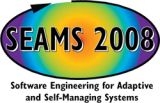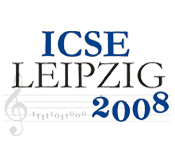Program
Monday, May 12, 2008 |
|
|
09:00 |
Opening |
|
09:15 |
Keynote: Jeff Kephart, IBM Research, USA Autonomic Middleware for Green Data Centers Data center energy consumption is a major and growing concern worldwide. Among many alarming trends, half of all data centers are now suffering from insufficient power and cooling capacity, and power has recently become the second-highest operating cost. Moreover, data centers now account for over 5% of all global emissions of CO2. In response to these concerns, researchers are exploring a myriad of different methods for reducing power consumption at a wide range of spatial and temporal scales. At the finest level of granularity, chip manufacturers are including processor controls that allow the processor frequency and voltage to be reduced for power savings. To a certain degree, these control knobs can be managed at the platform or operating system level based on performance counters, cpu utilization, and other low-level metrics. In this talk, I explore the role that autonomic middleware can play in reducing energy consumption in data centers. Because the actual and desired application-level metrics are accessible at the middleware level, there are several opportunities for saving energy that are simply not available at the platform and OS levels. For example, middleware that is cognizant of performance-related Service Level Agreements can deliberately reduce the use of computational resources such that the desired performance levels are not overachieved, and less energy is consumed. I will describe several theoretical and experimental studies that demonstrate that, with the right algorithms and architecture, autonomic middleware can work either unilaterally or in concert with platform-level power control mechanisms to achieve significant energy savings. I will also discuss a potentially broader role for autonomic middleware that looks upward to the data center level, working in tandem with power distribution units and cooling units to intelligently manage resources to satisfy performance and availability objectives while saving energy. |
|
10:00 |
Session 1. Papers
From Goals to Components: A Combined Approach to Self-Management
Towards Goal-Oriented Development of Self-Adaptive Systems |
|
10:30 |
Nutrition Break |
|
11:00 |
Session 1. Papers 30 min Discussion |
|
11:30 |
Session 2: Papers Self-Healing by Means of Automatic Workarounds
Slicing for Model Reduction in Adaptive Embedded Systems Development 30 min Discussion |
|
12:30 |
Lunch |
|
14:00 |
Session 3. Papers Modeling Collaborations with Dynamic Structural Adaptation in Mechatronic UML Endogenous Versus Exogenous Self-Management Component Engineering for Adaptive Ad-hoc Systems Towards Decentralized Self-adaptive Component-based Systems 30 min Discussion |
|
15:30 |
Nutrition Break |
|
16:00 |
Session 4. Papers Automating Discovery of Software Tuning Parameters Monitoring Multi-tier Clustered Systems with Invariant Metric Relationships Mohammad Monitoring in Adaptive Systems using Reflection 30 min Discussion |
|
19:30 |
SEAMS 2008 Reception (A la Carte Menu or Buffet) |
|
|
|
|
|
Tuesday, May 13, 2008 |
|
09:00 |
Keynote: Robert Baillargeon (General Motors, USA) Automotive Adaptation: The Challenges of the Automotive Cyber-Physical System The Automobile historically has had to adapt to many different modes of usage. However the modes of usage and optimization of operation of usage are largely handled by the most adaptable component of the vehicle ... the driver. As society and customer expectations change, more of the functionality of the future is dependant on self-adaptivity and self-management to support the evolution of vehicle capabilities. We look at what the capabilities of the future and the challenges to achievement to set a trajectory for the needs for self-managing systems and their underlying architectures for the vehicle domain. |
|
9:45 |
Session 5. Papers Scheduling Time-bounded Dynamic Software Adaptation Runtime Adaptation in a Service-Oriented Component Model Discussion |
|
10:30 |
Nutrition Break |
|
11:00 |
Session 6: Papers Policy-Based Self-Adaptive Architectures: A Feasibility Study in the Robotics Domain Adaptivity at Every Layer -- A Modular Approach for Evolving Societies of Learning Autonomous Systems Friends or Foes? -- A Conceptual Analysis of Self-Adaptation and IT Change Management An approach to adapt service requests to actual service interfaces 30 min Discussion |
|
12:30 |
Lunch |
|
13:30 |
Panel: A Research Road Map for Adaptive Systems Panelist
|
|
15:30 |
Nutrition Break |
|
16:00 |
Closing Session |
|
17:00 |
Have a productive and fun ICSE! |

